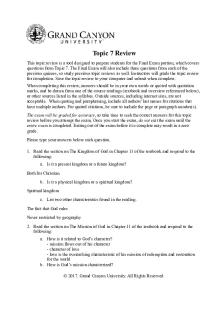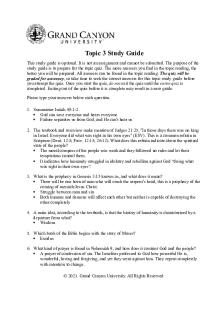CWV 101 RS T1Review Online PDF

| Title | CWV 101 RS T1Review Online |
|---|---|
| Course | Christian Worldview |
| Institution | Grand Canyon University |
| Pages | 4 |
| File Size | 91.5 KB |
| File Type | |
| Total Downloads | 52 |
| Total Views | 128 |
Summary
Download CWV 101 RS T1Review Online PDF
Description
Topic 1 Review This topic review is a tool designed to prepare students for the Topic 1 Quiz. Instructors will grade the topic review for completion. Save the topic review to your computer and submit when complete. When completing this review, answers should be in your own words or quoted with quotation marks, and be drawn from one of the course readings (textbook and lecture referenced below), or other sources listed in the syllabus. Outside sources, including internet sites, are not acceptable. When quoting and paraphrasing, include all authors' last names for citations that have multiple authors. For quoted citations, be sure to include the page or paragraph number(s). The quiz will be graded for accuracy, so take time to seek the correct answers for this topic review before you attempt the quiz. Once you start the quiz, do not exit the quiz until the entire quiz is completed. Exiting out of the quiz before it is complete may result in a zero grade. Please type your answers below each question. 1. List three analogies for worldview used in Chapter 1 of the textbook. The three analogies for worldview used in Chapter 1 are lenses, the box top of a jigsaw puzzle and story/foundation. 2. List the various definitions and descriptions of worldview found in the textbook and lecture. A worldview concept is a basis of assumptions that are a person’s commitment that serves as their framework to understand and interpret reality that inevitably shapes that persons behavior on how they think and live. One variation is how one chooses to live within that framework, then you have those who use that framework to see and life and the world as whole affecting their perspective whether it is right or wrong and lastly the framework can be used comprehensively to affect the conscience and subconscious decisions. 3. Match the following worldview terms (Atheism, Pantheism, Theism, and Deism) with the correct description below. a. Belief in a personal and relational God who created and sustains all that exists: Ones belief in a personal and relational God is called Theism. b. Belief in a God who created all things but is not relational or involved in the world: A person’s belief in a God who created all things but not relational is Deism. c. Belief that “all is god” and in a strong sense of spiritualism but not in a personal God: Pantheism is a belief of more spiritualism rather than focus on God. d. Belief based only on the natural or physical realm with no spiritual or supernatural: Atheism is a belief that there are no god’s just physical realms.
4. According to Chapter 1 in the textbook and Lecture 1, which worldview families use both faith and reason? All worldviews require faith and reason. 5. What kind of person does James 1:26 speak about? The person who is talked about in James 1:26 is a hypocrite. 6. Summarize Proverbs 8:10-11. Choose to pursue Godly wisdom because that wisdom is worth more than gold, silver or any other jewel you could ever receive. 7. What is the difference between private and shared worldviews? A private worldview is about personal experiences that have helped mold your beliefs. Shared worldview is where the community has helped shape your belief system. 8. Briefly describe the three worldview tests. There are three worldview tests; the first is the coherence test that examines your internal consistency aligns with others; the second is the practical test that examines how well your view is livable in all areas of your life. Lastly the correspondence test examines how well your views respond to reality. 9. Match the following worldview elements (Ultimate Reality, Nature of the Universe, Human Nature, Knowledge, Ethics, and Purpose) with the correct question below: a. Is there absolute truth? - Knowledge b. Is there a God? - Ultimate Reality c. How do we know right from wrong? -Ethics d. Is there a spiritual part to the universe? -Nature of the Universe e. Does life have meaning? -Purpose f. Are humans merely higher orders of mammals? -Human Nature 2
10. When discussing worldviews, what is the difference between an open system and a closed system?
When participating in a discussion on the difference between an open system and a closed system you would need to know that a closed system is where God lets nature take its course with out interference. An open system is the belief that God is the influence of the world.
3
References Hiles, J. S., & Smith, A. F. (2015). Evaluating wisely. In Grand Canyon University (Ed.), The beginning of wisdom: An introduction to Christian thought and life (2nd ed.). Available from http://gcumedia.com/digital-resources/grand-canyon-university/2015/the-beginningof-wisdom_an-introduction-to-christian-thought-and-life_ebook_2e.php Lecture 1. (2017). CWV-101: Christian Worldview. Phoenix, AZ: Grand Canyon University. Waddell, J. (2015). Seeking wisdom. In Grand Canyon University (Ed.), The beginning of wisdom: An introduction to Christian thought and life (2nd ed.). Available from http://gcumedia.com/digital-resources/grand-canyon-university/2015/the-beginning-ofwisdom_an-introduction-to-christian-thought-and-life_ebook_2e.php...
Similar Free PDFs

CWV 101 RS T1Review Online
- 4 Pages

CWV 101 RS T1Review Online
- 4 Pages

CWV-101-RS-T1Review-Online
- 3 Pages

CWV 101 RS T6Review Online
- 4 Pages

CWV 101 RS T7Review Online
- 3 Pages

CWV 101 RS T3Review Online
- 4 Pages

CWV 101 RS T7Review Online
- 4 Pages

CWV-101-RS-T2Review-Online
- 4 Pages

CWV 101 RS T2Review Online
- 4 Pages

CWV 101 RS T2Review Online
- 4 Pages

CWV 101 RS T5Review Online
- 3 Pages

CWV 101 RS T7Review Online
- 4 Pages

CWV 101 RS T6Review Online
- 4 Pages

CWV 101 RS T7 Review Online
- 4 Pages
Popular Institutions
- Tinajero National High School - Annex
- Politeknik Caltex Riau
- Yokohama City University
- SGT University
- University of Al-Qadisiyah
- Divine Word College of Vigan
- Techniek College Rotterdam
- Universidade de Santiago
- Universiti Teknologi MARA Cawangan Johor Kampus Pasir Gudang
- Poltekkes Kemenkes Yogyakarta
- Baguio City National High School
- Colegio san marcos
- preparatoria uno
- Centro de Bachillerato Tecnológico Industrial y de Servicios No. 107
- Dalian Maritime University
- Quang Trung Secondary School
- Colegio Tecnológico en Informática
- Corporación Regional de Educación Superior
- Grupo CEDVA
- Dar Al Uloom University
- Centro de Estudios Preuniversitarios de la Universidad Nacional de Ingeniería
- 上智大学
- Aakash International School, Nuna Majara
- San Felipe Neri Catholic School
- Kang Chiao International School - New Taipei City
- Misamis Occidental National High School
- Institución Educativa Escuela Normal Juan Ladrilleros
- Kolehiyo ng Pantukan
- Batanes State College
- Instituto Continental
- Sekolah Menengah Kejuruan Kesehatan Kaltara (Tarakan)
- Colegio de La Inmaculada Concepcion - Cebu

